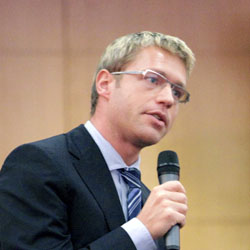The International Paralympic Committee: A Winning Model for Addressing Gender Equity in Sport? Michael Pedersen
February 27, 2014

The International Paralympic Committee also exemplifies gender equity leadership in the area of event governance
The International Paralympic Committee has taken great strides over recent years to also address gender equity in the area of event governance. By the 2016 Paralympic Games in Rio de Janeiro, the number of women taking part in the Paralympics will have doubled in 20 years. At the 1996 Paralympic Games in Atlanta, 790 women (24 percent of the total number of athletes) took part in the Games. At the 2016 Paralympic Games in Rio de Janeiro, the number is set to rise to 1,650 (38 percent of all athletes). Also, at the 2016 Paralympic Games in Rio de Janeiro, women will compete in 43 percent of all medal events. That comprises a 12 percent increase compared to the 2012 Paralympic Games in London.
The International Paralympic Committee exemplifies gender equity leadership too by actively supporting efforts of the European Union
The International Paralympic Committee has taken a particularly active role in supporting the European Union’s work on gender equity in sport. Sir Philip Craven, President of the International Paralympic Committee, spoke at the 2013 EU Conference on Gender Equality in Sport. Also, Ms Tine Teilmann, Chair of the ‘Women in Sport Committee’ of the International Paralympic Committee, has been appointed as a member of the so-called ‘European Group of Experts’ to create proposals for a strategy on gender equality in sport.
Last not least, the International Paralympic Committee is also a patron of the 2014 IWG World Conference on Women and Sport.
Critical questions for sport leaders to ask themselves
Inspired by the case of the International Paralympic Committee, critical questions for sport leaders to ask themselves, as they start modernizing governance standards for the future, include:
> What can you learn about gender equity in sport from the case of the International Paralympic Committee?
> To what extent is gender equity in sport a separate challenge, to what extent is it part of the challenge of establishing sound sport governance standards and to what extent is it a key component of successfully achieving strategy?
> What is the real scope of gender equity in sport? – Internal governance vs. athletic governance vs. event governance vs. ‘sport in society’ governance?
> Is anything really speaking against exemplifying leadership on gender equity in sport and shaping evolving good practice?
> If you were to have achieved full gender equity in your sport by 2020, what would it look like, how would your sport be different from today and what would the benefits be compared to today?
> Appreciating the potential scope and benefits of achieving gender equity in sport, what would the additional benefits of further broadening the scope of the work along the lines of working towards diversity as such be? – Including age, religion, race and other relevant aspects to reflect societal demographics?
A special appreciation
I would like to appreciate the kind support of Ms Tine Teilmann, Chair of the ‘Women in Sport’ Committee of the International Paralympic Committee, in providing perspectives and information for this contribution.
Links to my previous contributions for iSportconnect’s expert column on sport governance:
7) ‘Football in Germany: A Model Case for Addressing Match-Fixing?’
5) ‘England and Wales Cricket Board: A Winning Model for Transparency and Accountability in Sport?’
4) ‘Badminton World Federation: A Winning Model for Democratizing Sport in the 21st Century?’
2) ‘The Business Case for Good Governance in Sport’
1) ‘Sport Governance – What Are We Actually Talking About?’
Michael Pedersen, Founder of M INC., is an internationally recognized expert and leader in good governance, transparency, ethics and integrity.Michael is the former Head of the World Economic Forum’s Partnering Against Corruption Initiative, an international good governance partnership with over 175 multinational companies and their CEOs. He holds three MSc degrees; an MSc in Global Leadership; an MSc in Responsibility and Business Practice; and an MSc in International Relations.
Michael is passionate about sport. Sport has and continues to play an important role in his life. He is of Danish origin and currently lives in Lima, Peru and in Barcelona, Spain.
He also publishes a leadership series on good governance in sport that is available for free download at:http://minc.ch/sport-practice.html
{jcomments on}




